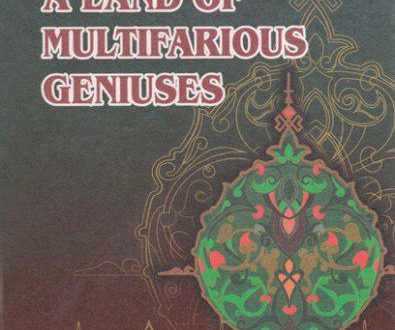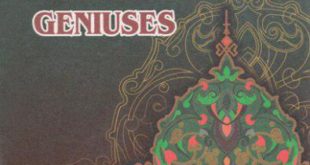Thus, on the bases of the above-mentioned facts, we can say that the lyrical heritage of Sufi Allayar plays an important role in estimating the ideal spirit and literary aesthetic qualities of the author. They are considered to be the most precious materials in the process of studying and estimating the historical and social situation of the period in which Jthe poet lived. Being aware of the fact that he would find respect and appreciation among public, Sufi Allayar left the following lines of verses:
Man of worth isn’t noticed when he is alive, safe and sound,
He will be valued after he leaves for that world of unknown.
Though Allayar sprang from Utarchi and is said to be bad,
He will also be honoured in some years; alas, he will not know that.
By means of these lines, the poet was surely predicting his future fame. Even in his lifetime, he became famous with his poems and research works in the area reaching Eastern Turkistan. After his death, he became a respected and an estimated figure among the public of Kashgar, the territory stretching along the banks of the Volga River,Caucasus,Small Asia and Khorasan. His memory hasbecome one of the component parts of international valuables. Thanks to the independence gained by our country, Sufi Allayar and his literary and scholarly heritage is being studied and appreciated.
The necessity of revising and spreading our literary heritage makes it possible to direct these studies and investigations into the right way and correct approach. A noticeable activity is being carried out in this direction.
Ubaydulla Islamqul oghli Alamkash, a researcher of the literary heritage of Sufi Allayar, wrote a good commentary on the work of the poet “Sabatul-ajizin” and left a verse denoting the time of the poet’s death meaning 1133/1721. His burial place is in Vakhshivar village of Surkhandarya region and it became one of the sacred places of pilgrimage for the Muslims.
“Maslaku-l-muttaqin”
Sufi Allayar created “Maslaku-l-muttaqin” when he became a mature lawyer and scholar which occupies a special place in the creative activity of the author. This work is devoted to the description of the problems of rules of Shariah,spirituality,morality,as well as the history of Islam. It was created in the poetic “aruz” style. The work consists of twelve thousands “bayts”[1] including 135 chapters of different length. The author of the book writes the following lines about his book:
I’ve written a book in the languages of Persians,
You’ll find there reliable answers to your questions,
All notes and remarks on religion are found there,
More than twelve thousand bayts mirror them there.
The person who translated the book “Maslaku-l-muttaqin” into Uzbek in the form of prose under the title of “Hidayatu-l-mutta-qin” is Quzibay Hafiz. Edited by Sayfiddin Sayfullah, Akram Dehqan and Sheikh Abdulaziz Mansur, this translation was published in 2008 in the ” Movaraunnahr” publishing house. This book has already become a spiritual property of our people.
“Maslaku-l-muttaqin” was specially used in madrasahs as a manual for the students of Islam. The students used to call this manual as “Maslak”.
Before the publication of “Maslaku-l-muttaqin”, all the texts and manuals on the Islamic teachings were written in the Arabic language and they were not accessible for those Muslims who did not speak Arabic. Therefore, Sufi Allayar wrote his book in Persian so that those Persian-speaking readers could read and understand the meaning of this book. As the author states, this book appeared in the world as a result of researching and studying more than 100 books having to do with the subjects discussed in this book. Lithographic publications of this book as well as its manuscripts have widely been spread in the countries of Central Asia, Afghanistan, Pakistan, Turkey, China, Bashkiria, Tataristan, India, etc.
All the subjects discussed in “Maslaku-l-mustaqin” are commented on in accord with the requirements of the Holy Qur’an, laws of Shariah as well as the Hadiths. This book is still retaining its importance as one of the main and precious sources of literary, scientific, philosophical and educational value.
“Sabatu-l-ajizin”
The second book by Sufi Allayar “Sabatu-l-ajizin” is written in the poetic style. Unlike the first book of the author, it is written in the Turkish (Uzbek) language. This book discusses some problems of Sufism, human values and some principles of morality from the literary point of view. The author expresses his opinion about this book through following lines:
When my Turkish friends my book had seen,
They said if that book had been blessed by men,
If ‘aqida’(belief) were written in the Turkish language.
The hearts would be joyful, get delight on reading each page.
This offer was accepted by the author with a great pleasure and he appreciated the efforts of his countrymen and decided to satisfy the demands of his people.
I’m only a cover, I’m not full, and I’m an empty purse,
I’ve been told several times about it by my friends.
But I’ve done my best in proving my thoughts by meaningful words,
The book is titled “Sabatu-l-ajizin” which deals with holy words.
In order that such people as I am would be glad,
I provided some ideas from “Nasayih”.
As has been mentioned above, “Sabatu-l-ajizin” by Sufi Allayar was several times republished in Tashkent in 1882, 1884, 1905 and 1915, in Kagan in 1910 and in Kokand in 1890. This fact shows that this book was highly appreciated by the public and was one of the beloved books of the Islamic students.
The first pages of the book begin with the explanation of the importance of belief (faith) for man, for humanity. According to his opinion:
Those who are not aware of aqida’ are said to be pals of demon,
Let them try to learn it within thousand years, but it’ll be in vain.
Containing a great amount of useful advice and instructions for younger generation which produce a good influence on the youth in the process of upbringing them, this book can be included into the list of books of great importance even today.
[1] bayt — two lines of verse.
 Imom Buxoriy xalqaro ilmiy-tadqiqot markazi bukhari.uz
Imom Buxoriy xalqaro ilmiy-tadqiqot markazi bukhari.uz











